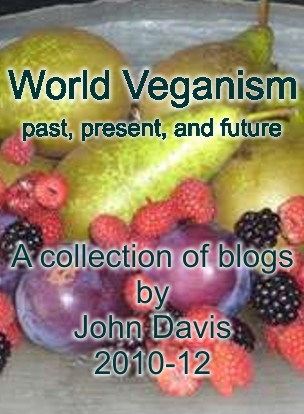March 9, 2011
"Do you have anything vegetarian?"
"Yes, do you eat fish?"
"No, vegetarians don't eat fish."
"Some vegetarians here eat fish."
"No, some people eat fish and unfortunately call themselves vegetarian, but they could call themselves Martians if they like, it doesn't mean they are...."
"Oh, so what do you eat then?"
"I eat plants."
Blank look. End of conversation. They seem to be thinking that I might like to go out and graze on the lawn...
It should be simple: Vegetable - vegetation - vegetarian - all derived from the Latin 'Vegetabile' which roughly translates as 'plant'. So vegetarians eat plants.
But of course it isn't simple. I've lost count of how many times I've gone through this. Do the same in India and you're offered lassi and paneer. Milk products are not plants either.
Some years ago a poll in the USA asked people if they were vegetarian - up to 12% said yes. More detailed surveys of what people actually ate showed that nearer 1% came within even a loose genuine definition of 'vegetarian'. That left about 30 million Americans who think vegetarians are flesh-eaters.
Even that loose definition included eggs, dairy and honey - which don't look much like plants to me. Back in the 19th century some people did actually claim that milk was a plant because it was just grass that passed through a cow. The same logic would make meat a plant too, not that many cows get anywhere near grass these days.
The Americans in those days were at least a little more accurate than the British - early 19th century American books often referred to their 'vegetable and milk diet' - the Brits added eggs but still called it just a 'vegetable diet'!
The first people to call themselves 'vegetarian', around 1840, really did just eat plants, we have now proved that beyond doubt. If they'd had more money our history would have been different - but just as they launched the world's first Vegetarian Society they fell apart and it was rescued by the vegetable-egg-and-milk eaters who were then stuck with the word 'vegetarian'.
They knew they weren't really vegetarians and spent the rest of the 19th century trying to solve the problem of the wrong name. In 1871 the President proposed changing it to 'Diet Reform Society', which would have been better, but he was narrowly out-voted and the problem continued.
Then they spent most of the 20th century trying to pretend the problem didn't exist. The classic was the silly fiction of vegetarian being derived from the Latin Wegetus' -meaning 'whole, fresh, lively' - so fresh milk? No problem, it's vegetusian (and why not fresh meat?). But it was fiction and now we've proved that too.
So 'vegetarian' really does just mean someone who eats plants.Some people call themselves 'pesco-vegetarian' - I'm not bothered by that if they really are just eating plant food with occasional fish, like Bill Clinton does now. Though I'd guess most of them include eggs/dairy which are neither pesco nor veg.
In India there are several hundred million people following what was originally just a Hindu diet - plant-food-plus-milk-products. Thanks to the British they're now called lacto-vegetarians, which again wouldn't be a problem, except that it takes too long to say all that. So they just shorten it a bit to 'vegetarian' - which all adds to the confusion with a lot of people being convinced that all 'vegetarians' must be eating vast amounts of cheese.
In fact the most recent USA polls show that 66% of those genuinely within the broad ovo-lacto-vegetarian definition in that country don't use any eggs or dairy products at all.
Ah, so they're vegan then?
Nope, 'vegetarian' minus eggs/dairy does not necessarily equal 'vegan'.
The original vegans saw it as an ethical lifestyle, as do many today - treating all non-human animals with the same respect as humans (I refuse to define veganism with a long string of negatives!). That goes for clothes, entertainment, research, work etc., etc., as well as food. Would you wear human skin on your feet..? Well, apart from your own I suppose.
So, for them, someone who only eats plants, but wears leather or goes to rodeos, is not a vegan - though many others just see it as a diet and call themselves vegan because they just eat plants, which is what 'vegetarian' really means, as opposed to ovo- lacto-pesco- pollo- or even carno- vegetarians. So now we're all confused again. What we should have:
Vegetarian - someone who just eats plants.
Vegan - a person living an animal-respecting ethical lifestyle, including a vegetarian diet. So simple, but I doubt if we'll get back to it in my lifetime. Maybe it would be easier to invent some new words and start again. So next restaurant:
"Do you have anything plantatarian?"
"Yes, do you eat eggplants?"
"Only if they're free-range."
For the real origins of 'vegetarian' see 'Vegetarian Equals Vegan' in the History section.
note... in recent years biologists have deemed that fungi and algae no longer belong in the kingdom of plantae. But for most of us common folk a definition of 'plant' would be something that grows in the ground and cannot move around of its own accord - sounds like a mushroom to me:-) and the supermarkets will still sell mushrooms in the fruit and veg section....
later note... a couple of months after the above blog was written, the International Veg Union Council proposed a new definition of 'vegetarian', though it stopped short of 'plant food only' as we cannot dictate common usage - this was put to all the member organisations worldwide and was given a 95% majority support. So this definition is now used by IVU, but others will of course continue to define it their own way... details were in a later blog:
www.vegsource.com/john-davis/vegetarianism-re-defined.html
 John Davis
John Davis
